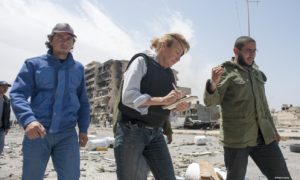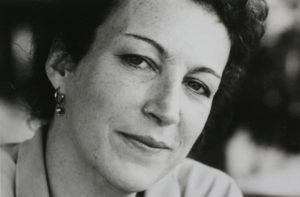
Marie Colvin was born in New York on January 12, 1956 and raised in Oyster Bay, Long Island. Upon graduating from high school, Marie attended Yale University where she got her start in journalism as a writer for the Yale Daily News. After graduating from Yale in 1978, Marie took her first job as a reporter with the Teamsters Union magazine. In 1982, Marie was hired as a reporter for United Press International (UPI) in New Jersey to cover local news. Marie was subsequently promoted to UPI Foreign Desk Editor and then Paris Bureau Chief. Marie was eventually offered a position to join The Sunday Times in the UK, where she would spend the rest of her career.
In her 25 years writing for The Sunday Times, Marie became renowned for her victim-centered dispatches from the war zones of the world. Her award-winning career as a war reporter extended from the 1987 siege of Basra in the Iran-Iraq war to the 2012 siege of Baba Amr during the ongoing Syrian civil war. She tirelessly worked to expose crimes against humanity, human rights abuses, and the ravages of war around the world.
Marie was a trailblazer for women in the field of war reporting, following in the footsteps of war correspondent Martha Gellhorn, who inspired Marie to take up journalism. As a woman on the battlefield, she overcame numerous challenges. Marie’s reporting centered on war’s innocent victims—particularly women and children. Her style, as she told the American Journalism Review in 2000, was to “go in bare and eat what they eat, drink what they drink, sleep where they sleep.”
During the East Timor crisis in 1999, she was credited with averting a massacre. She remained behind to report on 1,000 refugees under attack at a

U.N. compound. When her male colleagues fled, she noted wryly: “They don’t make men like they used to.”
In 2001, Marie was blinded in one eye while reporting from Sri Lanka when a grenade launched by a government soldier struck her causing serious injury. After a painful recovery, Marie returned to journalism, now wearing what would become her trademark eye-patch.
After the Arab Spring erupted across the Middle East and North Africa in 2011, Marie and photographer Paul Conroy traveled to Libya, Egypt, and Syria to report on unfolding events. After covering wars in Chechnya, the Balkans, Sierra Leone, Iraq, and Libya, Colvin described the 2012 bombardment of Homs, Syria as the worst conflict zone she had ever seen. She was killed by Syrian government forces in a targeted artillery attack on February 22, 2012.
In describing her career, Marie once wrote: “I did not set out to be a war correspondent. It has always seemed to me that what I write about is humanity in extremis, pushed to the unendurable, and that it is important to tell people what really happens in wars . . . .” Marie remained committed to exposing the realities of war and its forgotten victims until the end.

